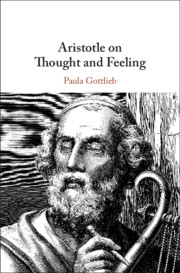Book contents
- Aristotle on Thought and Feeling
- Aristotle on Thought and Feeling
- Copyright page
- Dedication
- Contents
- Acknowledgments
- Abbreviations
- Introduction
- 1 The Psyche
- 2 Aristotelian Feelings
- 3 Developing Thought and Feeling
- 4 Aristotelian Choice
- 5 Akrasia
- 6 Thoughtfulness and Feelings
- 7 To Kalon and Music
- Conclusion
- Glossary of Key Terms
- References
- General Index
- Index Locorum
6 - Thoughtfulness and Feelings
Published online by Cambridge University Press: 08 January 2021
- Aristotle on Thought and Feeling
- Aristotle on Thought and Feeling
- Copyright page
- Dedication
- Contents
- Acknowledgments
- Abbreviations
- Introduction
- 1 The Psyche
- 2 Aristotelian Feelings
- 3 Developing Thought and Feeling
- 4 Aristotelian Choice
- 5 Akrasia
- 6 Thoughtfulness and Feelings
- 7 To Kalon and Music
- Conclusion
- Glossary of Key Terms
- References
- General Index
- Index Locorum
Summary
In Chapter 6, I consider how much integration of thought and feeling is required for a good character, and how much integration or disintegration of thought and feeling exists in the psyche of the bad person. Both discussions raise the question whether the good person has a pleasanter life than the bad person. I attempt to answer this question by distinguishing two levels of pleasure (and pain), and by applying Aristotle’s view that virtue is the measure of pleasure. The beginning of the chapter clarifies my view and addresses an objection that my account of the interdependence of thought, desire, and feeling in the good person is too demanding. My answer relies on Aristotle’s threefold analysis of a feeling as a physiological reaction, an impression of a salient consideration in the here and now, and a motivating desire to do this now. The good person can have physiological reactions without having a full feeling – so, for example, a good person may still be hungry even if she does not want to eat another chocolate now. The end of this chapter discusses the thought in thoughtfulness, addressing the objection that my account of the good person is not demanding enough.
- Type
- Chapter
- Information
- Aristotle on Thought and Feeling , pp. 104 - 121Publisher: Cambridge University PressPrint publication year: 2021

